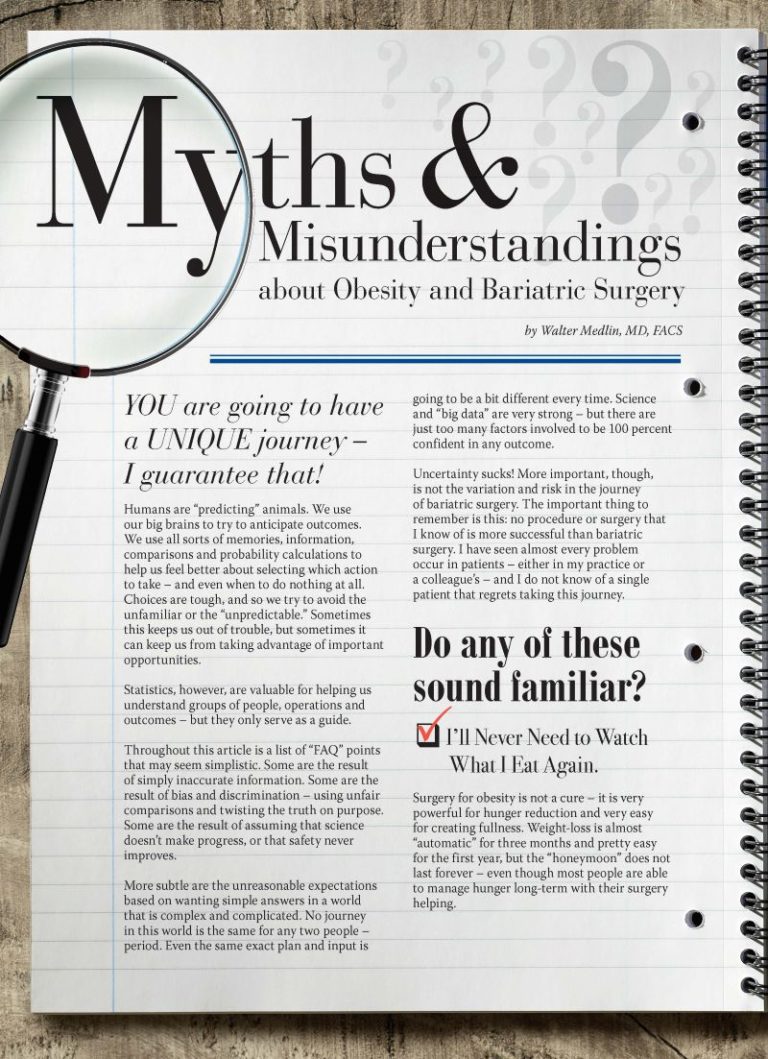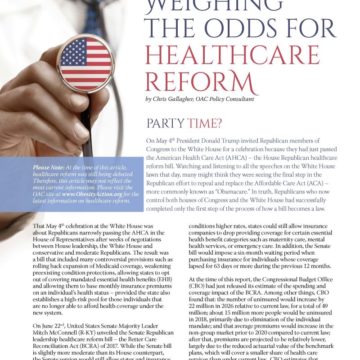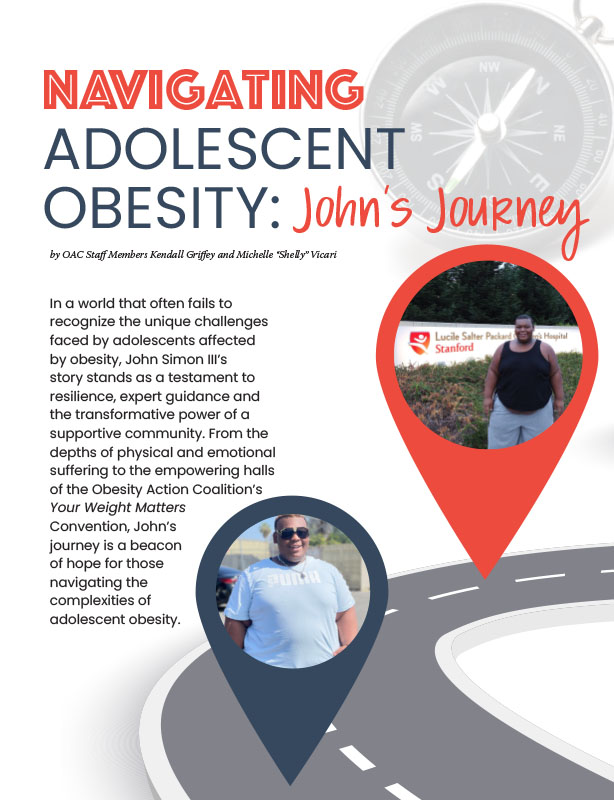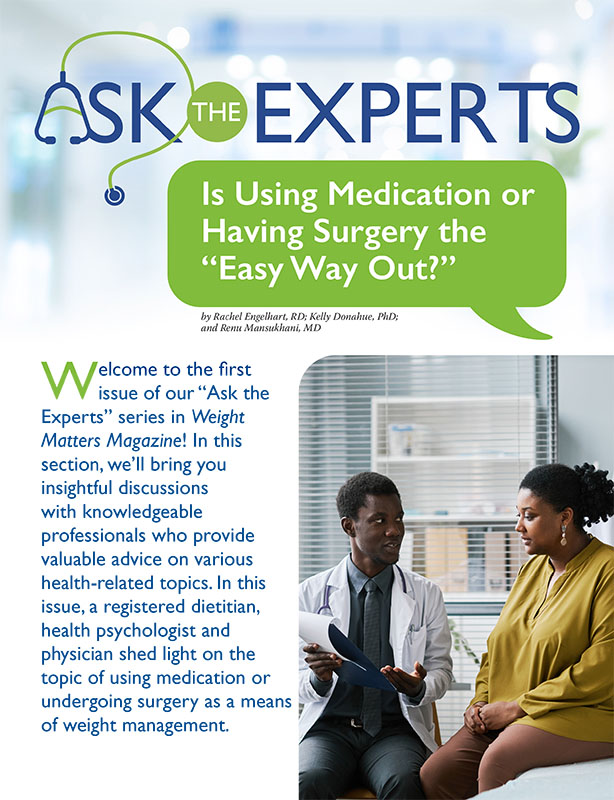Myths and Misunderstandings about Obesity and Bariatric Surgery


by Walter Medlin, MD, FACS
Spring 2017
YOU are going to have a UNIQUE journey – I guarantee that!
Humans are “predicting” animals. We use our big brains to try to anticipate outcomes. We use all sorts of memories, information, comparisons and probability calculations to help us feel better about selecting which action to take – and even when to do nothing at all. Choices are tough, and so we try to avoid the unfamiliar or the “unpredictable.” Sometimes this keeps us out of trouble, but sometimes it can keep us from taking advantage of important opportunities.
Statistics, however, are valuable for helping us understand groups of people, operations and outcomes – but they only serve as a guide.
Throughout this article is a list of “FAQ” points that may seem simplistic. Some are the result of simply inaccurate information. Some are the result of bias and discrimination – using unfair comparisons and twisting the truth on purpose. Some are the result of assuming that science doesn’t make progress, or that safety never improves.
More subtle are the unreasonable expectations based on wanting simple answers in a world that is complex and complicated. No journey in this world is the same for any two people – period. Even the same exact plan and input is going to be a bit different every time. Science and “big data” are very strong – but there are just too many factors involved to be 100 percent confident in any outcome.
Uncertainty sucks! More important, though, is not the variation and risk in the journey of bariatric surgery. The important thing to remember is this: no procedure or surgery that I know of is more successful than bariatric surgery. I have seen almost every problem occur in patients – either in my practice or a colleague’s – and I do not know of a single patient that regrets taking this journey.
Do any of these sound familiar?
I’ll Never Need to Watch What I Eat Again.
Surgery for obesity is not a cure – it is very powerful for hunger reduction and very easy for creating fullness. Weight-loss is almost “automatic” for three months and pretty easy for the first year, but the “honeymoon” does not last forever – even though most people are able to manage hunger long-term with their surgery helping.
I Won’t Need to Change My Lifestyle.
A few patients have “perfect” outcomes and only have an appetite problem based on genetics. The rest of us (99 percent) still have to work on something to get durable results. Expect challenges and changes along the way, but not all at once. Adjustments happen continuously and even years after surgery, so keep your program team close and see them regularly – forever!
I Have to Change EVERYTHING.
Too many people are afraid that they have to become a “marathoning vegan” who cooks three times a day, never eats tasty food and has to live a “boot camp” lifestyle. We do have to try to live healthy, but everyone has to live a real life with compromises and adjustments. Yes, most of us need some change, but usually not as much as you might worry about.
I’ll Lose a lot of Weight Really Fast.
Within the first few months, it is common to lose 10 or even 20 pounds each month. Usually after that, one to two pounds per week is common – and small “plateaus” happen to almost everyone.
I Am Too High Risk.
Surgery is relatively safe – even for many people who have had previous heart attacks and strokes and for many who are in need of kidney, liver or heart transplants. In fact, it can often be helpful in these conditions.
I Am Too Old.
Most programs operate on patients well into their 70’s. Good medical evaluation helps us prepare and “tune up” before surgery in order to reduce any risks.
It Won’t Work for Me.
(Note: this was my main concern before my operation, even though I had done more than a thousand successful operations before having it myself.)
No operation is perfect, but this is almost never a problem. The real worry is long-term, 5-20 years out for most. Even then, a 20 pound regain is the BEST time to be making sure you are getting evaluated by your program. Most people do not regain more than half the weight that they originally lost.
I Will Be a Failure if I Don’t Meet My “Goal” Weight and My Team Will Be Angry.
Setting a “goal” weight isn’t always helpful. Set a goal lifestyle and a goal for a healthy relationship with food and self-care. My personal goal for myself and my patients is to be alive and kicking butt at age 80! Be amazing – and be good to yourself. We will watch our weight, too – but it is not the same as happiness.
It Always Fails.
This is absolutely untrue! Our goal is not a cure for issues with weight (expectations that are unrealistic cannot be met), but total weight regain is virtually unheard of with an intact tool. For example, there are a majority of patients who opt to have their lap band emptied or surgically removed after 10 years. Old gastric bypass and vertical banded gastroplasty operations can “undo” themselves in rare cases with gastro-gastric fistula. They can regain back to baseline weight, but it is not a failure of the patient or of the original operation.
Insurance Never Pays.
Every insurance company has policies that pay if they cover federal employees, Medicare or Medicaid patients. They just may not sell that policy to small employers. Most of the largest companies (Fortune 500) have coverage! Advocacy, however, is important. We know dozens of workplaces and public entities (like my home in Salt Lake City) that have added coverage in the last few years alone because of patients who have advocated for access to care.
I Haven’t Earned It/Don’t Deserve It.
Studies have shown that self-blame and shame can keep patients from seeking appropriate, evidence-based care for weight management. This may be the most common barrier to making that first appointment.
I Don’t Want to Be Opened Up.
Less than 1 in 200 patients have an incision larger than an inch for new bariatric surgeries. This includes those who have had other major “open” operations for hernias, gallbladder issues, colon surgery, etc. There is always a chance of this surgery happening, so it may be on your consent form as “possible open surgery” – but don’t expect it to be needed. Even those few who do require a large incision do much better than in previous decades.
I Will Only Be Living on Shakes and Liquids.
This is inaccurate, but it’s a common mistake that people make. Brief preoperative liquid diets are common for a week or two. As you recover, protein shakes are needed just for convenience – but within 30-90 days, patients are back to consuming many regular foods with slow intake and good chewing.
My Body Won’t Look Right after Surgery.
Extreme television has made this seem like a common occurrence. Plastic surgery is common, but not in the extreme. At one year after surgery, temporary hair loss and muscle loss are at their maximum – but recovery after 18 months is amazing! (This is better with regular exercise and following nutritional guidance.)
My ________ Died from It.
Older operations were more dangerous, and today’s intensive care colleagues have many more tools so that even complications such as pneumonia, heart attack and blood clots occur less common – therefore minimizing life-threatening risks.
My ________ Gained ALL of their Weight Back.
(See above) Gastric band and the “breakdown” of a few old operations can cause weight regain, but in the most common scenario, weight only comes halfway back. (The patient may have excess weight, but their friends and casual observers either forgot or never knew where they started from.)
I Just Need to Get My Head Together.
Obesity is not a character flaw or a “simple” psychological error in thought process. Yes, you should take factors such as stress and emotional eating seriously if you deal with them. Yes, you should seek good care for issues with mental health. Please know that this is not going to result in massive weight-loss, however (despite the fact that a few medications for mental health can directly lead to significant issues with appetite). This is also true with substance abuse.
I Have Failed Everything Else – this Won’t Work Either.
No other treatment directly modifies your hunger in a durable way like surgery is able to do. Medications can provide a short or medium-term change, but only while you are taking them –and the effect usually diminishes over time.
Once they Fix My (Knee/Back/Hernia), I Will Exercise and Lose It All without Surgery.
Research has shown that it just doesn’t work that way. You may become more active, fit and happy, but you will almost certainly not lose as much weight in the long-term as many of us believe.
I Just Need Help to Lose the Weight, and Then I Can Keep It Off on My Own.
Again, as much as we want it to be true, our appetite is largely controlled by genes – and that is a lifelong condition that needs lifelong treatment. (By the way – this means you really should get almost all the credit for staying in your program, no matter what the scale says!)
My Primary Doctor Hates It, and He Has Seen Too Many Complications.
Studies have shown that many doctors’ and nurses’ bias against obesity and patients with obesity gives them misconceptions about “risk versus benefit”. That is to say – they far underestimate the risk of doing nothing, and far overestimate the risk of surgery for obesity.
I Have Anemia, or I Am Afraid of Anemia and Other Mineral Problems.
These problems do happen, but they can be treated. Not everyone who has a problem is “skipping out” on their follow-up – but that is very common. Even if you are taking all your recommended supplements and vitamins, problems can occur. If you are getting regular lab testing (yearly for most who are stable), then a problem can be detected early and be corrected with less consequences. You do not want to be diagnosed with osteoporosis at a late stage! If we all live long enough, bone health is going to be a consideration. Early detection is key!
You are not alone, and you will never stop having doubts! Even my heroes have anxiety about “never going back” – and so do I. Our education goes on together. So, many thanks to the patients, professionals and the scientists who keep teaching me and challenging my own misconceptions!
About the Author:
Walter Medlin, MD, FACS, is a bariatric surgeon in Utah and sleeve gastrectomy patient now seven years post-op. He is a member of the OAC National Board of Directors and tweets @bonuslife.
by Kendall Griffey, OAC Communications Manager Spring 2024 We have officially kicked off Your Weight Matters Regional…
Read Articleby OAC Staff Members Kendall Griffey and Michelle “Shelly” Vicari Winter 2024 In a world that often…
Read Articleby Rachel Engelhart, RD; Kelly Donahue, PhD; and Renu Mansukhani, MD Summer 2023 Welcome to the first…
Read Article









